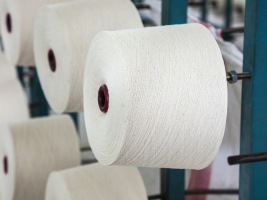
We are renowned the world over for collaboration with the top cotton yarn manufacturers in India, Producing Superior quality cotton yarns. Our product shows neat spinning, durability, colour fastness, requisite elasticity, etc., are some of the features that competently market our range of our knitting yarn, cotton yarn, combed knitting yarn, organic cotton yarn in the domestic as well as international marketplace. Meeting the stringent application requirements of varied industries, these combed knitting yarns comply with the requisite industrial standards. Available in multiple packaging options these knitting yarns cater to specific needs of textile, garment, weaving and many other industries.
All Counts of Yarn are available ranging from 1/2S to 1/100S.
Features Of Carded And Combed Yarn
Carded:
Best Quality from Top Cotton Yarn Manufacturers in India
Yarn manufacturing is a sequence of processes that convert raw cotton fibres into yarn suitable for use in various end-products. A number of processes are required to obtain the clean, strong, uniform yarns required in modern textile markets. Beginning with a dense package of tangled fibres (cotton bale) containing varying amounts of non-lint materials and unusable fibre (foreign matter, plant trash, motes and so on), continuous operations of opening, blending, mixing, cleaning, carding, drawing, roving and spinning are performed to transform the cotton fibres into yarn. One of our supplier who is cotton yarn manufacturers in Gujarat, has been in the business for over three decades and has established a reputation for producing high-quality cotton yarns. Their product line includes a variety of yarns for different applications, such as knitting, weaving, and more. They are known for their commitment to quality and customer satisfaction, making them a reliable choice for businesses looking for cotton yarn suppliers. Yarn manufacturing produces yarns for various woven or knitted end-products (e.g., apparel or industrial fabrics) and for sewing thread and cordage. Yarns are produced with different diameters and different weights per unit length. While the basic yarn manufacturing process has remained unchanged for a number of years, processing speeds, control technology and package sizes have increased. Yarn properties and processing efficiency are related to the properties of the cotton fibres processed. End-use properties of the yarn are also a function of processing conditions. If you’re looking for a reliable cotton yarn supplier, drop your inquiry here, whether you’re looking for open-end yarn manufacturers in India or top cotton yarn manufacturers in Gujarat, there are plenty of options to choose from. So don’t hesitate to explore your options and find a supplier that can help your business succeed. Type of Cotton YarnCategory
Counts
Open end yarns
2/1 to NE 20s/1
Ring spun carded yarns
10/1 to NE 40/1
Ring spun combed yarns
20/1 to NE 100/1
Specialty cotton yarns
30/1 to NE 100/1
Products
Standard Blend Regular Yarn
Count Range
Open End Yarn
100% Cotton
Ne 6/1 TO Ne 22/1
Carded Grey Single
100% Cotton
Ne 1.5/1 TO Ne24/1
Combed Grey Single
100% Cotton
Ne 10/1 TO Ne 40/1
Compact Yarn
100% Cotton
Ne 20/1 TO Ne 40/1
All Yarns Are Available In Double & Multifold Also
Products
Special Yarn
Count Range
Organic Cotton Yarn
Control Union Certified As Per Nop, Npop And Eec 2092/91 Standard
10/1 to 40/1 (Single & TFO)
Fair Trade Cotton Yarn
FLO Certified
10/1 to 40/1 (Single & TFO)
Usa Cotton Yarn
USA Cotton Mark Licencing
10/1 to 40/1 (Single & TFO)
Contamination Free Yarn
100% Imported Cotton
10/1 to 40/1 (Single & TFO)
Slub Yarn
100% Cotton
12/1 TO 40/1 (Single & TFO)
Core Spun Lycra
Cotton / Lycra or Spandex
16/1 to 32/1 (Single & TFO)
Reverse Twist Yarn “S” Twist
100% Cotton
10/1 to 40/1
Zero Twist Yarn
Cotton / PVA
10/1 TO 20/1
Dyed Yarn
Reactive Dyes, Natural Dyes
ANY COUNT (Single & TFO)
Organic Dyed Yarn
Gots Approved Dyes
ANY COUNT (Single & TFO)
Recycled Cotton Yarn
Recycled Cotton
2/1 TO 10/1
Recycled Polyester Yarn
Recycled Polyester
6/1 TO 20/1
- The yarn is more hairy.
- The yarn is more irregular.
- The yarn is cheaper.
- The yarn is less shiny.
- Some trash may be present in the yarn.
- Neaps can be present in the yarn.
- Possibility of irregular twist distribution in the yarn.
- The yarn is less hairy.
- The yarn is more regular.
- The yarn is more costly.
- The yarn is shinier.
- No trash can be present in the yarn.
- Neaps are not available in the yarn.


